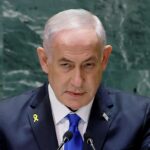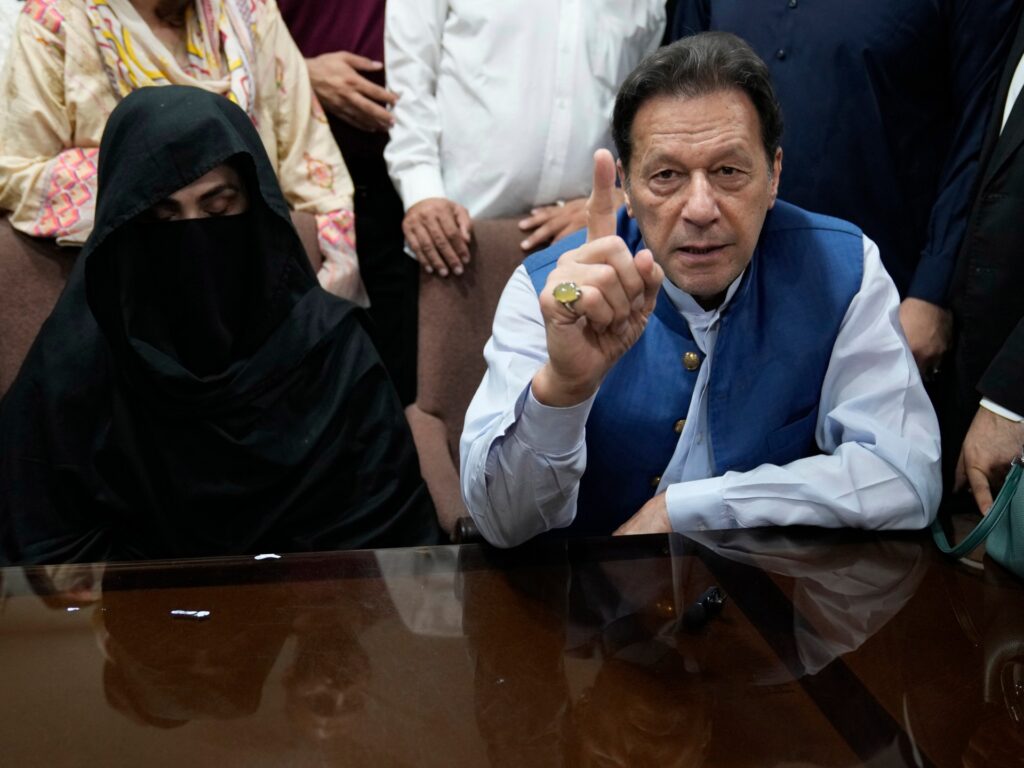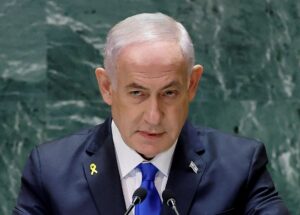
Islamabad, Pakistan – Pakistan’s former Prime Minister Imran Khan was on Friday sentenced to 14 years in prison, and his wife Bushra Bibi to seven years in a case related to the misuse of authority and corruption involving Khan’s Al-Qadir University Project Trust.
Khan was also given a fine of 1 million Pakistani rupees ($3,500), while Bibi was fined half that amount.
An accountability court operating from Adiala Jail in Rawalpindi, where Khan has been imprisoned since August 2023, had reserved its verdict in December last year and deferred the announcement three times. Bibi was arrested at the court premises.
Khan, who did not appear before the court on January 13 when the decision was delayed for a third time, had earlier claimed the delays were an attempt to “pressurise” him.
This marks the fourth major case in which the former prime minister has been convicted.
Three earlier convictions, announced in January last year, were related to selling state gifts, leaking state secrets, and unlawful marriage, all of which were overturned or suspended. Despite this, Khan remains behind bars, with dozens of cases pending against him – a situation he describes as a political witch-hunt.
Advertisement
Khan was first arrested in connection with the Al-Qadir Trust case in May 2023, spending less than two days in detention. However, the arrest led to nationwide protests during which Khan’s supporters rioted in multiple cities.
Faisal Fareed Chaudhry, Khan’s lawyer, condemned the decision as a continuation of “bogus persecution” against Khan and his wife.
“It is perhaps the only case where the National Accountability Bureau (NAB) couldn’t establish a loss of even a single penny,” the lawyer told Al Jazeera.
Chaudhry added that NAB failed to provide evidence of any financial loss to the state or any connection between the Al-Qadir Trust and personal financial gain for Khan or his family.
“Criminal proceedings against Khan and Bushra Bibi were not proven during prosecution. The entire case is politically motivated. I fail to understand how establishing a trust constitutes a conflict of interest,” the lawyer said.
Khan’s Pakistan Tehreek-e-Insaaf (PTI) party echoed Chaudhry in its first statement on the verdict.
“While the party awaits the detailed decision, it is important to note that the Al Qadir Trust case against Imran Khan and Bushra Bibi lacks any solid foundation and is bound to collapse,” the PTI said. “All evidence and witness testimonies confirm that there has been no mismanagement or wrongdoing. Imran Khan and Bushra Bibi are merely trustees with no further involvement in the matter.”
The charge sheet accused Khan and his wife of acquiring land worth billions of rupees (millions of US dollars) for the Al-Qadir Trust from Malik Riaz, a prominent property tycoon in Pakistan, to establish a nonprofit educational institute for the poor.
Advertisement
The NAB alleged that Khan, as prime minister from August 2018 to April 2022, made a quid pro quo deal with Riaz, enabling him to launder more than $239m. This allegedly caused significant losses to the national treasury.
According to the NAB, the PTI government gave legal cover to Riaz’s black money, which had been recovered by the United Kingdom’s National Crime Agency and handed over to the Pakistani government.
Khan was ousted from power in April 2022 via a parliamentary vote of no confidence, which he attributes to a conspiracy involving the country’s military and the United States, allegations both have denied.
Pakistan’s military has held significant political influence, ruling the nation directly for nearly three decades since its formation in 1947, and was once seen as Khan’s benefactor and architect of his rise to power, before the two fell out. While no prime minister in Pakistan’s history has completed their tenure, three of four military dictators ruled for nearly a decade each.
The verdicts against Khan and his wife coincide with ongoing negotiations between the PTI and the current government of Prime Minister Shehbaz Sharif on several issues, including Khan’s release.
Islamabad-based lawyer Hafiz Ahsaan Khokhar said that the case involved exhaustive proceedings, with at least 100 hearings in the past year.
“The core issue is money laundering, and NAB provisions are explicit regarding dishonesty and misuse of authority by public office holders. Additionally, both the Supreme Court and the federal cabinet were misled, and state money was unlawfully redirected for personal gain,” Khokhar told Al Jazeera.
Advertisement
Political analyst Majid Nizami said the Al-Qadir Trust case stands out among the dozens against Khan due to the extensive documentation and time taken for prosecution.
“This case has lasted the longest, with thousands of pages of evidence presented. There were certainly irregularities warranting investigation,” Nizami told Al Jazeera.
However, the analyst also highlighted the long history of political victimisation in Pakistan. “Instead of focusing on justice, our history shows we tend to focus on vindictiveness. In this case, too, the discourse will revolve around political victimisation rather than the merits or demerits of the case,” he added.
With three rounds of negotiations already held between the government and PTI, Nizami fears the conviction might derail the talks.
“When talks began, it was agreed that dialogue would continue regardless of the verdict, but the conviction may strain these efforts,” the Lahore-based Nizami warned.
He suggested that internal divisions within the PTI might resurface, with factions supporting resistance likely prevailing over those advocating for patience and dialogue.
“This could once again lead to a more aggressive stance by PTI going forward,” he said.











More Stories
Israeli cabinet approves Gaza ceasefire deal with Hamas
Gaza atrocities will ‘haunt’ Antony Blinken, says former US diplomat
More than 230,000 displaced in DRC since start of the year, UN says